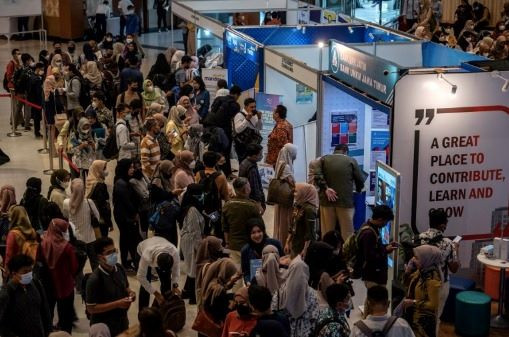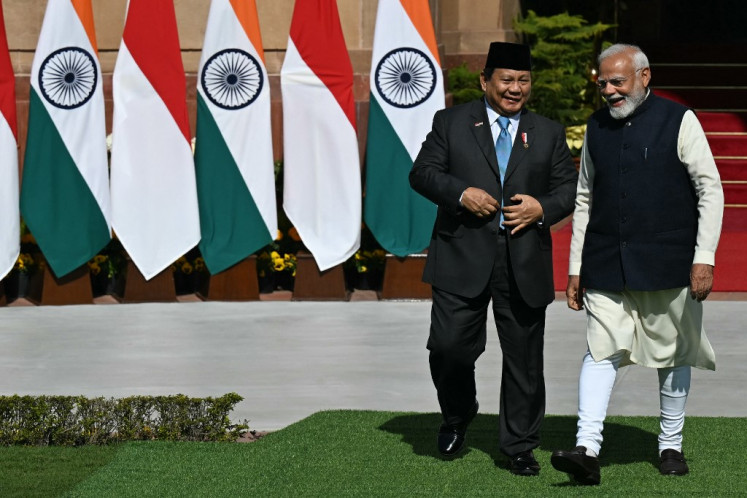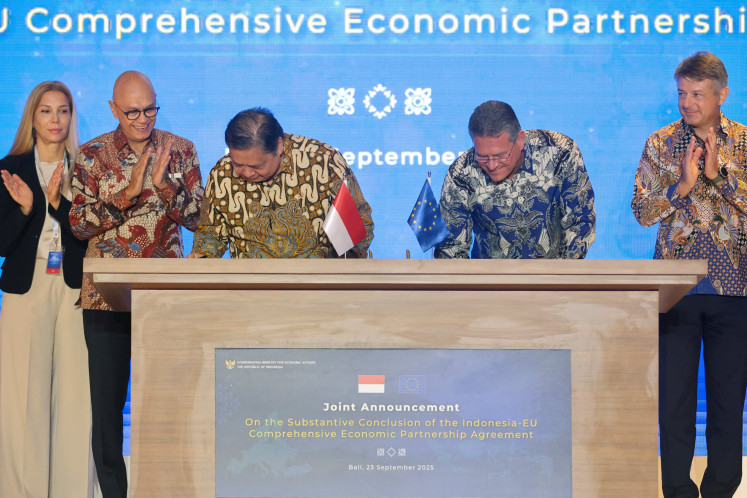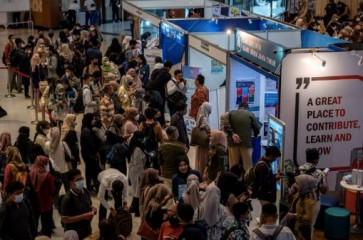Popular Reads
Top Results
Can't find what you're looking for?
View all search resultsPopular Reads
Top Results
Can't find what you're looking for?
View all search resultsIndonesian middle class: The victims of backburner policy
The first focus is that the government must continue to create job opportunities and encourage foreign direct investment in labor-intensive sectors.
Change text size
Gift Premium Articles
to Anyone
 Looking up: Crowds of job seekers throng a job fair on March 7, 2023 in Surabaya, East Java. Data from Statistics Indonesia show that open unemployment in the country was 4.82 percent of the 149.38 million-strong workforce in February 2024, down 0.63 percent compared to the same period last year. (Antara/Juni Kriswanto)
Looking up: Crowds of job seekers throng a job fair on March 7, 2023 in Surabaya, East Java. Data from Statistics Indonesia show that open unemployment in the country was 4.82 percent of the 149.38 million-strong workforce in February 2024, down 0.63 percent compared to the same period last year. (Antara/Juni Kriswanto)
“Backburner” is a term used by Jakarta teenagers to express their feelings about the uncertain relationship between themselves and someone else, and it is also a song by Indonesian singer Niki. This term is considered apt for describing the Indonesian middle class's feelings of uncertainty due to economic policies.
The middle class is neither a poor group receiving comfort through social assistance, nor is it a part of the wealthy group that is "overpowered" according to the current zoomer generation terminology.
The first issue the government faces in addressing the middle class is its inability to promote investment and exports that are labor-intensive, such as in the manufacturing sector, which significantly contributes to formal employment. According to a 2024 Statistics Indonesia (BPS) report, the manufacturing sector's contribution to gross domestic product (GDP) is only 18.9 percent.
The Dutch disease phenomenon is reflected in the current national economy, where, with Indonesia's per capita income currently at US$4,580, the manufacturing sector's contribution to GDP has been declining over the past two decades, impacting Indonesia's ability to become a developed country. Lessons from developed countries like Japan, South Korea and China demonstrate that boosting the manufacturing sector enhances income levels.
The second problem is the government's failure to maintain purchasing power, with the Center of Reform on Economics (CORE) research report for April-June 2024 indicating that Indonesian citizens' livelihood increasingly depends on the drawdowns on their savings deposits, as reflected in the decrease in the saving to income ratio in July 2024 to just 15.5 percent according to Bank Indonesia. Economic growth in the second quarter of 2024 grew by only 5.05 percent and experienced deflation for three consecutive months, recorded at 0.18 percent month-to-month in July 2024.
In addition to lacking comfort, the middle class also faces the threat of struggling to meet even their food needs if no new policy breakthroughs are made. According to CORE, household consumption, particularly after the general elections and Islamic Idul Fitri celebrations, has weakened, as reflected in the retail sales index, which decreased by around 1 percent in the second quarter of 2024.
The 2024 Mandiri Spending Index also reported that grocery expenditures increased from 13.9 percent to 27.4 percent year on year (YoY), in line with Engel's Law, which describes how consumption patterns differ among income groups and how this can contribute to economic inequality.


















